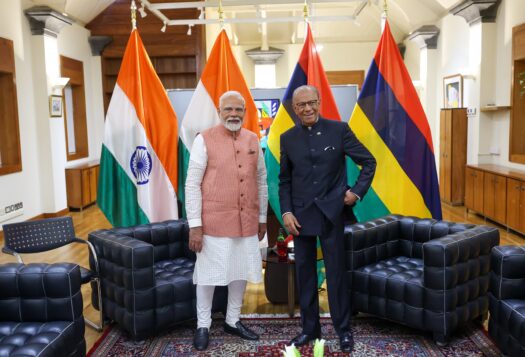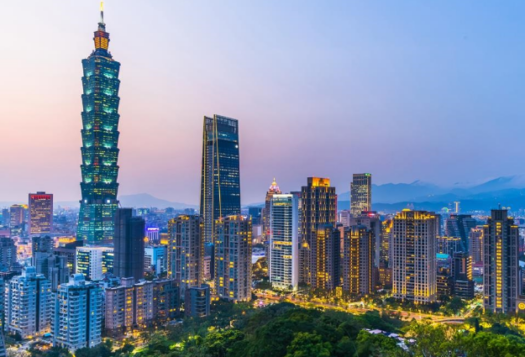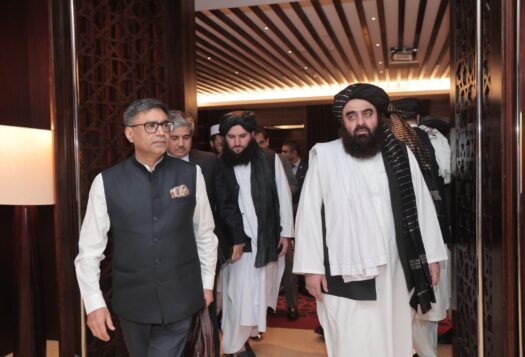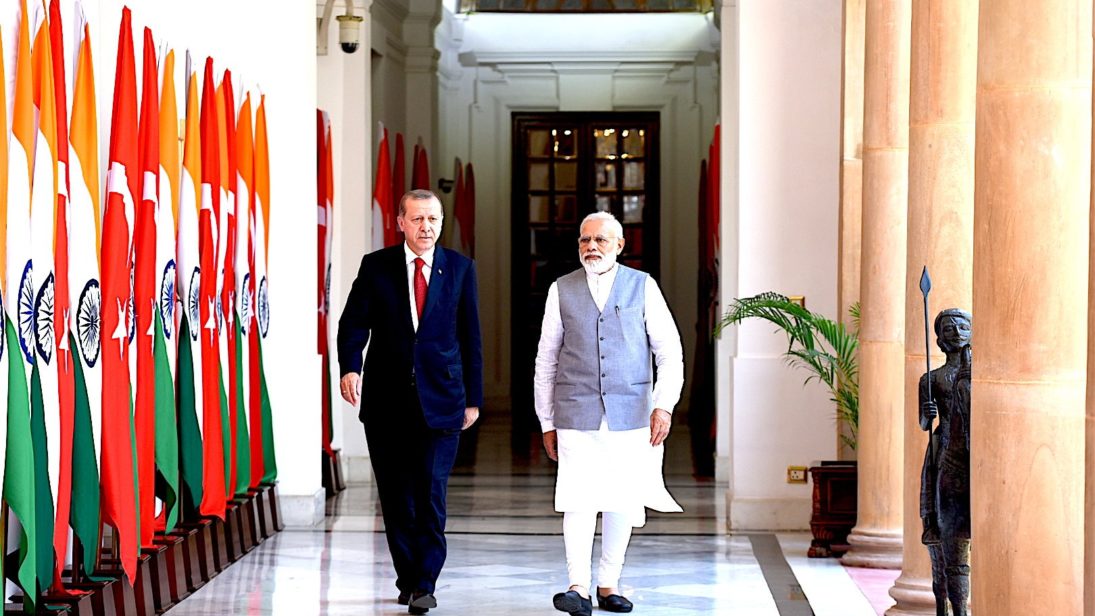
Just a few days after U.S. President Donald Trump announced his plans to withdraw troops from northeastern Syria, Turkish President Erdogan ordered his forces to move into the region in a bid to eliminate “terror threats,” which he sees as emanating from the Kurds. Turkey’s actions defied strong criticism from global capitals and threats of sanctions and embargoes. For Indian observers, however, New Delhi’s censure of Erdogan’s actions is both unprecedented and surprising. The otherwise reticent Ministry of External Affairs (MEA) expressed that India was “deeply concerned” about Turkey’s “unilateral” offensive and called upon Ankara to “exercise restraint and respect the sovereignty and territorial integrity of Syria.”
While India joined a host of nations criticizing Turkey, the view in India is that with this move, New Delhi avenged President Erdogan’s comments made at the United Nations General Assembly (UNGA) where he raised concerns about the “eight million people” stuck in a “besieged” Kashmir, much to the displeasure of New Delhi that views Kashmir as an internal issue. Indian foreign policy has traditionally not revolved around the principle of lex talionis—an eye for an eye—but rather that of modus vivendi, trying to reach an understanding with those who have opposing interests. However, it now appears that India is more willing to jettison its earlier principle in cases where it can leverage its own strengths as well as supportive externalities – in this case, global criticism of Turkey and Ankara’s relative decline – to secure its interests.
India’s Journey: From “No Opinion” to Public Rebuke
Indian foreign policy has traditionally not revolved around the principle of lex talionis—an eye for an eye—but rather that of modus vivendi, trying to reach an understanding with those who have opposing interests. However, it now appears that India is more willing to jettison its earlier principle in cases where it can leverage its own strengths as well as supportive externalities – in this case, global criticism of Turkey and Ankara’s relative decline – to secure its interests.
As a postcolonial state in the aftermath of World War II, past experiences animated India’s early imagination of the global order. India’s first premier Jawaharlal Nehru, very much an idealist and internationalist, viewed India as a moral force amidst the binaries of the occupiers and the oppressed, the axis and the allies, and capitalist and communist. In the 1950s, India opined openly and acted as a mediating force in the Korean War and subsequently invented and institutionalized the Non-Aligned Movement (NAM), an anti-imperialist bloc of mostly third-world countries that refrained from aligning with either the United States or the former Soviet Union. Nehru’s fantasies of internationalism, Asian solidarity, and non-alignment were shattered by India’s 1962 war with China, ushering India into an era of pragmatism and material self-interest wherein New Delhi acted as a “cautious power” in global affairs.
India’s hesitance to take a side on international issues, lest doing so impedes its ability to leverage its relationships with key players, has long been a focus of its foreign policy. From Soviet advances in Afghanistan to the U.S. “War on Terror” in Iraq, reticence was a continuous policy across political and ideological dispensations, sometimes for differing reasons. “No opinion” informally becoming the only opinion. This is particularly evident in India’s record of abstentions at the UN. For instance, India has abstained from multiple votes on human rights investigations in Syria – including being one of only three countries to abstain on a resolution condemning the Syrian government in 2012.
India has traditionally been vocal only on matters related to South Asia, thus berating Turkey was a leapfrog for the otherwise guarded South Asian giant. New Delhi has usually exercised restraint even when responding to similar events with high economic and security stakes, reserving stronger assertions in diplomatic communication mainly for issues related to Pakistan. In the past, when Turkey raked up the Kashmir issue, such as when Erdogan offered to help mediate the conflict during his 2017 visit to New Delhi or when Turkish Foreign Minister Mevlut Cavusoglu minced no words in 2018 stating that Turkey will “stand with Pakistan on Kashmir,” India’s reaction was measured and clichéd, stating only: “our position is very well known…the entire state of Jammu and Kashmir is an integral part of the territory of India.” Thus, the dramatic change in India’s reaction even from 2017 to now means this issue merits careful examination.
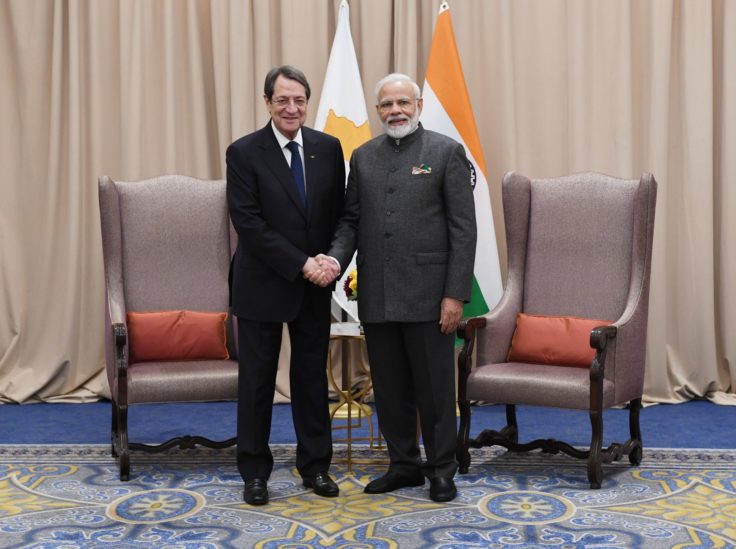
Assertive India
Three factors may have contributed to New Delhi’s newfound assertiveness in this case. First, the relatively little consequences for New Delhi in terms of global opinion after downgrading Kashmir’s autonomy may have imbued India with greater confidence in its ability to position and defend itself. Barring statements from Turkey, Malaysia, and China, most countries refrained from commenting on India’s move to withdraw Jammu and Kashmir’s special status. Second, conventional wisdom suggests that India’s global economic importance as a market of 1.3 billion people and its status as the second-largest arms importer contributed significantly to its confidence to withstand any international reaction. Finally, the drivers of India’s new foreign policy pathways recognize its potential in shaping world affairs as a leading power unafraid of leveraging its might to safeguard its interests—even if it means treading away from its traditionally cautious “balancing” approach.
The drivers of India’s new foreign policy pathways recognize its potential in shaping world affairs as a leading power unafraid of leveraging its might to safeguard its interests—even if it means treading away from its traditionally cautious “balancing” approach.
However, there were supporting external factors at play that helped India deploy this assertiveness against Turkey. Arguably, near-universal condemnation for Ankara’s “unlawful and unwarranted” actions made it easier for India to join the long-list of nations denouncing Turkey’s offensive. Further, India and Turkey currently have limited bilateral relations and trade stands at a paltry USD $8.6 billion. Efforts to improve relations have been hindered by the severe baggage of Ankara’s “unconditional” camaraderie with Islamabad. Therefore, New Delhi’s decision to up the ante at the cost of its ties with Turkey did not risk significant economic and political consequences for India. Turkey’s economic and militarily decline also made it a soft target for India’s rebuke.
Further, the MEA’s censure of Turkey was not the only attempt at feather-ruffling on India’s part, and appears to be part of a larger counter-offensive strategy. The strongly-worded berate followed two conspicuous bilateral meetings that India conducted last month along the sidelines of the 74th UNGA with Armenia and Cyprus, two countries that have sour relations with Turkey. In the two bilateral meetings in New York, Prime Minister Narendra Modi notably reiterated India’s firm support for Cypriot “independence, sovereignty, territorial integrity and unity” and simultaneously accepted an invitation to visit Armenia. Additionally, it has been reported in the Indian press that the Ministry of Defence is reconsidering a naval deal that would have seen the Hindustan Shipyard Limited (HSL) enter a USD $2.3 billion contract to build fleet-support vessels with a Turkish manufacturer. Reportedly, the Indian government has also “put off” Prime Minister Modi’s trip to Turkey, a visit that Ankara awaited. Moreover, the Indian Embassy in Ankara has put out a travel advisory asking Indian tourists to “exercise utmost caution” while traveling to Turkey. Experts believe this could impact tourism to Turkey, which is an emerging travel destination for Indians.
India has also taken a tougher stance towards Malaysia after Prime Minister Mahathir Mohammad condemned India saying it had “invaded and occupied” Kashmir. Reports that India is “mulling restricting imports” from Malaysia in response to Mahathir’s comments indicate that its assertiveness is more than a “rare rebuke” as otherwise speculated. Notably, however, India has not acted more assertively towards China when it supported Pakistan in calling for a closed-door UN Security Council meeting on Kashmir.
Conclusion
Under the premiership of Narendra Modi, India’s foreign policy has acquired a new dimension and redefined the paradigm. These recent events suggest India may be shedding its guarded nonalignment approach of the past and adopting a more calculative slant in protecting its most vital interests, using its strengths and supportive factors in its external environment to its advantage. However, it remains to be seen whether this behavior will repeat itself when dealing with more difficult cases, such as China. Although engaged in a cautious strategy of balancing China, which has often stood unquestionably with Pakistan on Kashmir, New Delhi has refrained from pulling the same punch so blatantly against Beijing—its more powerful next-door competitor with whom it has an already troubled history—highlighting the limits of India’s recent assertiveness.
***
Image 1: Narendra Modi via Twitter
Image 2: Narendra Modi via Twitter
